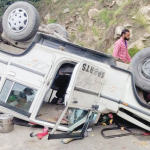The Fire Services Week is currently underway. It is being observed throughout India from 14th to 20th April. This year the theme of National Fire Service Week is “Awareness in Fire Safety for Growth of National Infrastructure”. The aim of observing Fire Service Week is to spread awareness among the public regarding fire safety and minimizing the damage through timely and effective response. Over the years, there has been a surge in the number of fire incidents in the valley. However, Fire and Emergency Service Department is not to be held solely responsible for the magnitude of damage in these incidents. At many places, especially in Srinagar, houses are stacked so close together that every time a fire breaks out, there is every chance of it spreading far and wide causing maximum damage. The congestion of houses poses a major hurdle to the fire tenders in dousing the flames. This helplessness has been evident in some of the most congested localities of the city center and in the downtown areas. Property worth crores has been reduced to ashes in recent years. The number of fire accidents keeps increasing in the valley, but nobody is ready to take the responsibility making it much more difficult to address the problem. While the affected people keep accusing fire services department of inaction, officials often blame people for negligence. Besides other factors, lack of basic safety measures, leakage of LPG cylinders, short circuits in residential houses etc alone account for 80 percent of the fire incidents. Also, Non-implementation of fire safety standards in both commercial and residential enterprises has also been blamed for the frequent fire accidents. Far-flung areas have also witnessed increase in fire incidents over the years especially in winter months when the area mostly remains cut off from the rest of the region. The fire management has also been affected by the deficiencies pertaining to fire stations, fire fighting, rescue vehicles and manpower. There is a dire need to upgrade the training programme for Fire Service personnel to equip them to deal with the challenges. Instead of taking a holistic view of the problems facing effective fire management, the government’s response has at best been relief-centric. Though we often hear of extending cash compensation for the fire victims, we hardly hear of any major decision being taken to avert such incidents. The need of the hour is to frame sustainable policy for mitigation, prevention, preparedness and fast response during fire calamities. There is always a scope of improvement, provided the authorities show willingness in this regard.








